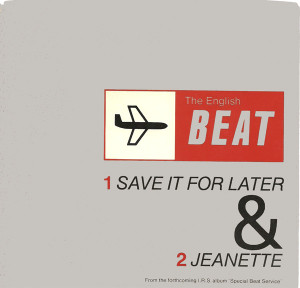
40. The English Beat, “Save It for Later”
Since this is a chart for U.S. college radio that we’re tracking through, we are obligated to refer to the band featuring both Dave Wakeling and Ranking Roger among the ranks by the vulgar and pedantic moniker the English Beat. In their native U.K., there was no need for the geographic qualifier, of course. The original name for the group preserved truth in advertising since the ska-singed beat delivered didn’t necessarily call to mind the British Isles. The Beat were already a force on the U.K. charts by the time they released their third album, Special Beat Service, in 1982. As it happened, the track that served as the album’s lead single had its beginnings back when hit songs were little more than a fanciful dream for singer and guitarist Dave Wakeling. As he explained it, “Save It for Later” was a piece of advice to himself. “I wrote it when I was a teenager,” explained Wakeling. “I wrote it before the Beat started. And it was about turning from a teenager to someone in their twenties and realizing that the effortless promise for your teenage years was not necessarily going to show that life was so simple as you started to grow up. So it was about being lost, about not really knowing your role in the world, trying to find your place in the world.” Although adults were quick to offer advice, Wakeling determined, they didn’t really have life figured out either. Under those circumstances, it was acceptable to decide to wait until the answers came along on their own.

39. Go-Go’s, “Our Lips are Sealed”
Astute music fans may notice that Terry Hall, lead singer of the Specials, is credited with co-writing “Out Lips are Sealed,” the debut U.S. single and first major hit for the Go-Go’s. The genesis of the song is a little more complicated than the usual collaboration, though. Hall was in Los Angeles with his bandmates, and several of them saw Go-Go’s play a show at, appropriately, the Whisky a Go Go on the Sunset Strip. The visitors were bedazzled enough to offer the Go-Go’s a spot as opening act on their upcoming tour. As sometimes happens, a road romance bubbled up. The songwriting credit is the only clue needed to determine the other half of the couple: Go-Go’s guitarist Jane Wiedlin. “Jane had gotten involved with the Specials’ lead singer, Terry Hall, when we’d been in London,” Go-Go’s lead singer, Belinda Carlisle, wrote in her memoir. “After we left, he sent Jane a letter about their complicated situation. She set some of the lines from that letter to music, added some lyrics of her own (she’s a genius), and, voila, she had ‘Our Lips are Sealed.'” Carlisle claimed she knew the song was a hit from the moment she first heard it. Wiedlin wasn’t so confident. “We’d been together about two years when I wrote that,” she recounted. “Some of the songs from the very beginning were songs that ended up part of our repertoire. Others fell by the wayside. I remember when I wrote it, I was really afraid to show it to the band in case they didn’t like it and all this stuff. But luckily they did like it.” A lot of people liked it. Released as the first single from the band’s smash hit 1981 debut album, Beauty and the Beat, the song made it into the Billboard Top 40. Surprisingly, its peak at a relatively modest #20 officially makes the pop radio mainstay one of the weaker-charting efforts of the band’s five Top 40 hits, outpacing only the largely-forgotten “Turn to You.”

38. U2, “Sunday Bloody Sunday”
On January 30, 1972, a group of citizens were marching in the streets of Derry, a city in Northern Ireland. They were protesting the internment of hundreds of Irish people under the British government’s Operation Demetrius, an initiative against the Irish Republican Army. Although the protesters were peaceful, British soldiers opened fire on the crowd, hitting 28 unarmed people, 14 of whom died as a result. While this might not automatically seem like prime material for a rock ‘n’ roll song, U2 had no aversion to weighty topics. Still, the band members knew that they needed to be thoughtful in their approach. “We all had a hand in that song, because it’s probably the heaviest thing we’ve ever done, lyrically,” guitarist the Edge noted. “It’s hard for us to justify a title like ‘Sunday Bloody Sunday,’ and we are all aware of that. We realize the potential for division in a song like that, so all we can say is that we’re trying to confront the subject rather than sweep it under the carpet.” According to the Edge, the mindfulness extended to a pledge to the audience when U2 debuted it live in Belfast. Bono promised a condemnation from the crowd would ensure that they never played it again. Instead, it has reverberated from the stage well over eight hundred times, to date. Not only did U2 band have no cause to strike it from their set lists, “Sunday Bloody Sunday” served as the lead track on War, the band’s third album, released in 1983. It was also issued as a single, though it — perhaps pointedly — was the only single from the album that failed to chart in their Irish homeland.
As we go along, I’ll build a YouTube playlist of all the songs in the countdown.
The hyperlinks associated with each numeric entry lead directly to the individual song on the playlist. All images nicked from Discogs.
Discover more from Coffee for Two
Subscribe to get the latest posts to your email.